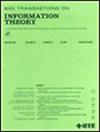Transmit or Retransmit: A Tradeoff in Networked Control of Dynamical Processes Over Lossy Channels With Ideal Feedback
IF 2.2
3区 计算机科学
Q3 COMPUTER SCIENCE, INFORMATION SYSTEMS
引用次数: 0
Abstract
We study networked control of a dynamical process over a lossy channel with a hybrid automatic repeat request protocol that connects a sensor to an actuator. The dynamical process is modeled by a Gauss-Markov process, and the lossy channel by a packet-erasure channel with ideal feedback. We suppose that data is communicated in the format of packets with negligible quantization error. In such a networked control system, whenever a packet loss occurs, there exists a tradeoff between transmitting new sensory information with a lower success probability and retransmitting previously failed sensory information with a higher success probability. In essence, an inherent tradeoff between freshness and reliability. To address this tradeoff, we consider a linear-quadratic-regulator performance index, which penalizes state deviations and control efforts over a finite horizon, and jointly design optimal encoding and decoding policies for the encoder and the decoder, which are collocated with the sensor and the actuator, respectively. Our emphasis here lies specifically on designing switching and control policies, rather than error-correcting codes. We show that the optimal encoding policy is a threshold switching policy and the optimal decoding policy is a certainty-equivalent control policy. In addition, we determine the equations that the encoder and the decoder need to solve in order to implement the optimal policies. More specifically, we show that the encoder must solve the Kalman filtering equations, a mismatch linear equation, and a Bellman optimality equation, while the decoder must solve a linear filtering equation and an algebraic Riccati equation.传输还是重传?有理想反馈的有损信道动态过程网络化控制中的权衡取舍
我们研究了通过有损信道对动态过程进行网络控制的问题,该控制采用混合自动重复请求协议,将传感器与执行器连接起来。动态过程由高斯-马尔科夫过程建模,有损信道由具有理想反馈的数据包测量信道建模。我们假设数据是以数据包的格式传输的,其量化误差可以忽略不计。在这样的网络控制系统中,每当发生数据包丢失时,就需要在以较低的成功概率传输新的感测信息和以较高的成功概率重新传输先前失败的感测信息之间进行权衡。从本质上讲,这就是新鲜度和可靠性之间的内在权衡。为解决这一权衡问题,我们考虑了线性二次调节器性能指标,该指标对有限时间跨度内的状态偏差和控制努力进行惩罚,并共同设计了编码器和解码器的最佳编码和解码策略,编码器和解码器分别与传感器和执行器共用一个位置。我们在此特别强调设计切换和控制策略,而不是纠错码。我们证明,最优编码策略是阈值切换策略,最优解码策略是确定性等价控制策略。此外,我们还确定了编码器和解码器为实现最优策略而需要求解的方程。更具体地说,我们表明编码器必须求解卡尔曼滤波方程、错配线性方程和贝尔曼优化方程,而解码器必须求解线性滤波方程和代数里卡提方程。
本文章由计算机程序翻译,如有差异,请以英文原文为准。
求助全文
约1分钟内获得全文
求助全文
来源期刊

IEEE Transactions on Information Theory
工程技术-工程:电子与电气
CiteScore
5.70
自引率
20.00%
发文量
514
审稿时长
12 months
期刊介绍:
The IEEE Transactions on Information Theory is a journal that publishes theoretical and experimental papers concerned with the transmission, processing, and utilization of information. The boundaries of acceptable subject matter are intentionally not sharply delimited. Rather, it is hoped that as the focus of research activity changes, a flexible policy will permit this Transactions to follow suit. Current appropriate topics are best reflected by recent Tables of Contents; they are summarized in the titles of editorial areas that appear on the inside front cover.
 求助内容:
求助内容: 应助结果提醒方式:
应助结果提醒方式:


